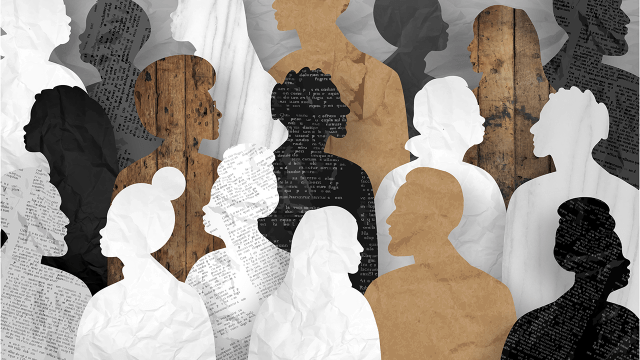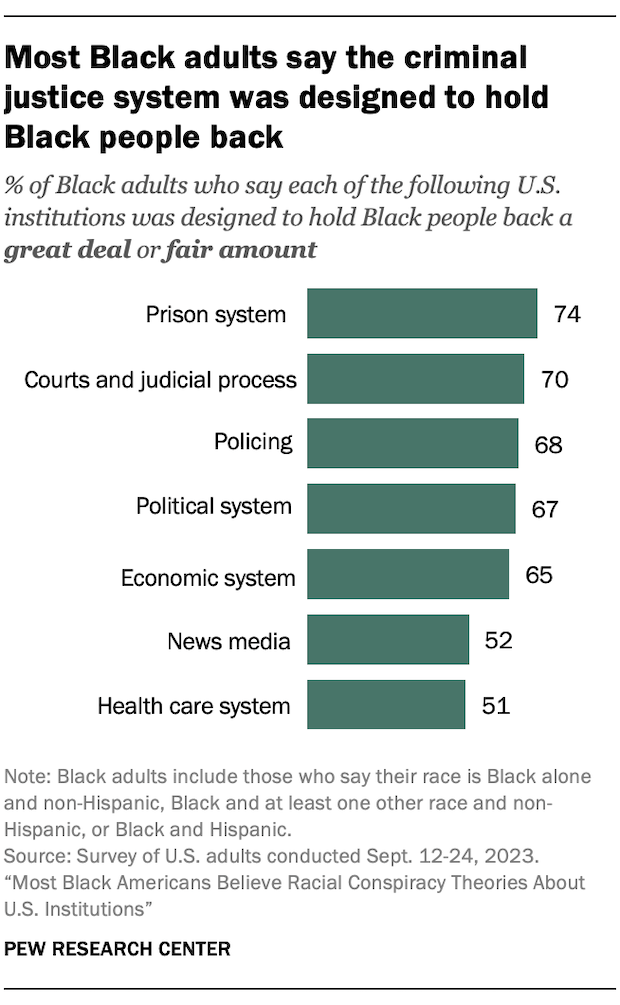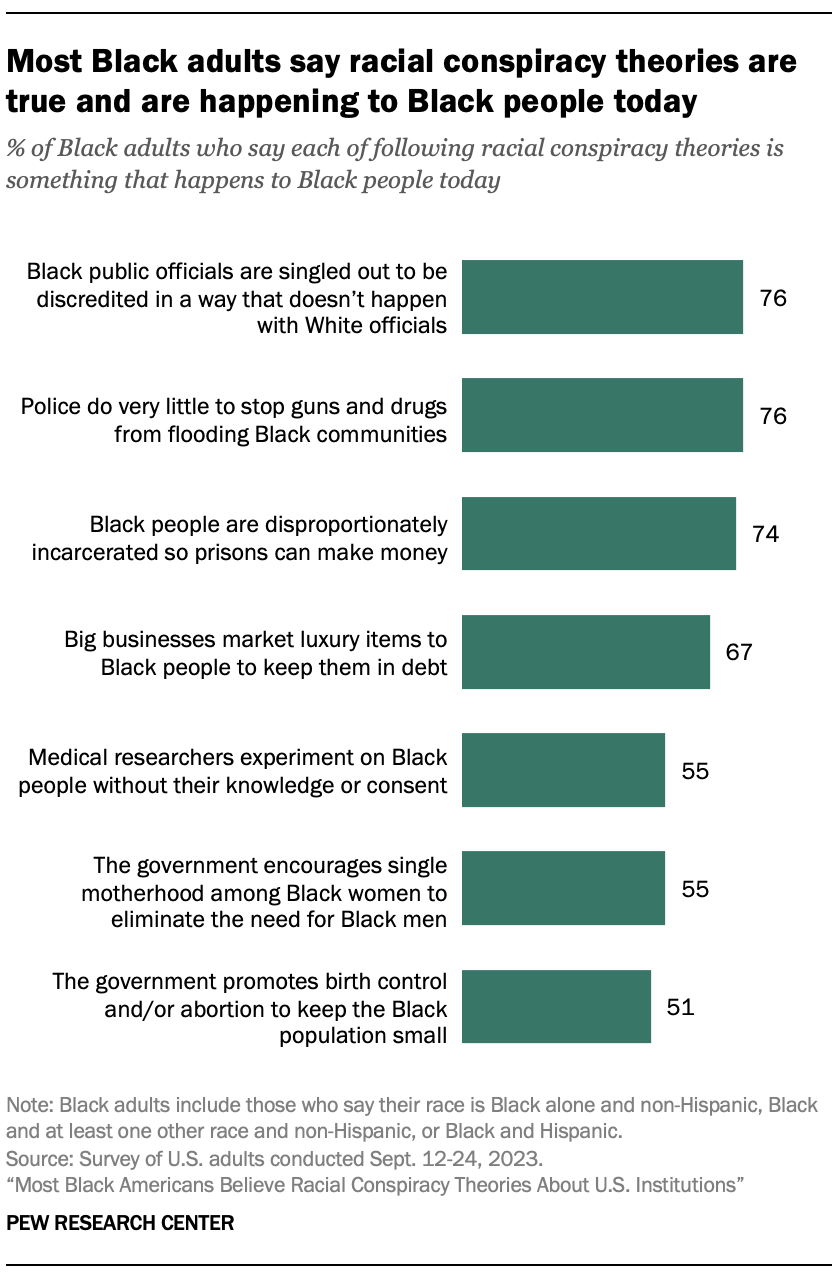Most Black Americans Believe Racial Conspiracy Theories About U.S. Institutions
Majorities say the criminal justice, political and economic systems were designed to hold Black people back

How we did this
Pew Research Center conducted this study to explore how Black Americans think about the factors that contribute to or hinder their success in the United States. An early 2024 report explored the success factors, and this current report focuses on the hindrances. Based on their real personal and collective historical experiences with racial discrimination, Black Americans might be suspicious of the actions of U.S. institutions.
These suspicions often circulate in Black spaces as stories about the intentional or negligent harm that hinders Black people from thriving. In this report, the phrase racial conspiracy theories refers to these stories of suspicion. Black adults were asked how familiar they are with these stories. Then, regardless of their familiarity, they were asked if they believed these things were restricted to the past or could also be happening today. Detailed examples of these ideas and corresponding survey results are discussed at length in Chapters 2-7.
We surveyed 4,736 U.S. adults who identify as Black and non-Hispanic, multiracial Black and non-Hispanic, or Black and Hispanic. The survey was conducted from Sept. 12 to 24, 2023, and includes 1,755 Black adults on the Center’s American Trends Panel (ATP) and 2,981 Black adults on Ipsos’ KnowledgePanel.
Respondents on both panels are recruited through national, random sampling of residential addresses. Recruiting panelists by mail ensures that nearly all U.S. Black adults have a chance of selection. This gives us confidence that any sample can represent the whole population (see our Methods 101 explainer on random sampling). For more information on this survey, refer to its methodology and questionnaire.
Terminology
To enhance readability, the phrase racial conspiracy theories is used throughout this report to refer to the suspicions that Black adults might have about the actions of U.S. institutions based on their personal and collective historical experiences with racial discrimination. From policing to media stereotypes to medical malpractice and more, Black adults were asked how familiar they are with these ideas and then, regardless of their familiarity, asked if they believed these things could be happening today. Detailed examples of these ideas and corresponding survey results are discussed at length in Chapters 2-7.
The terms Black Americans, Black adults and Black people are used interchangeably throughout this report to refer to U.S. adults who self-identify as Black, either alone or in combination with other races or Hispanic identity.
Throughout this report, Black non-Hispanic respondents are those who identify as single-race Black and say they have no Hispanic background. Black Hispanic respondents are those who identify as Black and say they have a Hispanic background. We use the terms Black Hispanic and Hispanic Black interchangeably. Multiracial respondents are those who indicate two or more racial backgrounds (one of which is Black) and say they are not Hispanic.
In this report, immigrant refers to people who were not U.S. citizens at birth – in other words, those born outside the U.S., Puerto Rico or other U.S. territories to parents who were not U.S. citizens.
To create the upper-, middle- and lower-income tiers, respondents’ 2021 family incomes were adjusted for differences in purchasing power by geographic region and household size. Respondents were then placed into income tiers: Middle income is defined as two-thirds to double the median annual income for the entire survey sample. Lower income falls below that range, and upper income lies above it.
Throughout this report, Black adults with upper incomes are those who have family incomes in the upper-income tier. Black adults with middle incomes and Black adults with lower incomes have family incomes in the middle- and lower-income tier, respectively. For more information about how the income tiers were created, read the methodology.
Throughout this report, Democrats are respondents who identify politically with the Democratic Party or those who are independent or identify with some other party but lean toward the Democratic Party. Similarly, Republicans are those who identify politically with the Republican Party and those who are independent or identify with some other party but lean toward the Republican Party.

While many Black Americans view themselves as at least somewhat successful and are optimistic about their financial future, they are also critical of U.S. institutions. Most say several systems in the United States need significant changes to ensure Black people are treated fairly.
Black Americans’ doubts about the fairness of institutions are accompanied by suspicion. Indeed, most Black adults say the prison (74%), political (67%) and economic (65%) systems in the U.S., among others, are designed to hold Black people back, according to a new Pew Research Center survey of Black adults conducted in September 2023.
The survey also finds that most Black Americans are familiar with specific racial conspiracy theories about U.S. institutions and believe they are true.
What is a ‘racial conspiracy theory’?
In this report, the phrase “racial conspiracy theories” refers to the suspicions that Black adults might have about the actions of U.S. institutions based on their personal and collective historical experiences with racial discrimination.
For example, 82% of Black adults say they have heard the following racial conspiracy theory about the prison system: Black people are more likely than White people to be incarcerated because prisons want to make money on the backs of Black people. Many Black adults (74%) say this racial conspiracy theory is true and happening in the U.S. today.

While psychologists say belief in conspiracy theories is often linked to paranoia or other mental health issues, the racial conspiracies that Black people believe are rooted in factual acts of intentional or negligent harm.
Well-documented examples include the surveillance of political leaders like Martin Luther King Jr., malpractice in medical research in the Tuskegee Syphilis Study and the massacre of Black people and destruction of their communities in Tulsa, Oklahoma, in 1921.
These historic events (and others described in later chapters of this report) provide the context for some Black Americans’ belief in racial conspiracy theories.
And to be sure, the majority of Black people are familiar with their history. Nearly 90% of Black adults consider themselves at least somewhat informed about U.S. Black history, according to a 2022 Pew Research Center survey. This includes 51% who say they are extremely or very informed.
Aside from well-known historical events, how often Black Americans experience racial discrimination is also a significant factor in shaping how familiar they are with racial conspiracy theories and whether they believe in them. There are also modest differences by gender, education, family income and political affiliation. Still, majorities of most Black demographic subgroups are familiar with these theories and believe in them.
For this report, we surveyed 4,736 Black adults in the U.S. from Sept. 12 to 24, 2023, in English and Spanish. Here are some other key findings about Black Americans and racial conspiracy theories.


